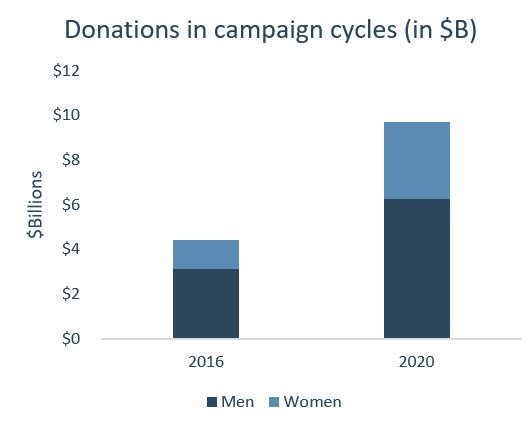The gender of money in politics
This is the hundredth time I’ve tried starting and restarting my post this week. I’m battling two sides of myself today–the “when they go low, we go high” half and the ‘I’m really pissed off” half.
I’m trying really really hard to stay away from commenting on the Supreme Court rulings. With Wallet Street, I intentionally avoid political affiliation and beliefs and focused on how our world’s financial systems, products and innovations affect your wallet.
(Also I know that the minute I dip my toe into this conversation, I’ll be reduced to an “emotional” and “b****y” woman. Two trigger words that I could spend hours on…)
But sometimes it’s just too much and too personal. I have spent every month since the age of 13 ½ thinking about pregnancy, fertility, and my reproductive organs. And I can pretty much guarantee that like me, every woman has at some point thought about what she would do if that period did not come that month.
5 people significantly eroded that choice last week, and it’s hard to put into words how physically bruised I feel.
I’ve been going through a whole grief cycle to deal with it (currently, I’m pretty stuck in phase 2: anger). I still have some things to work through, but let’s fast forward to acceptance (phase 5)...
I accept that this is how our society works: people with certain beliefs have lots of money → they use that money to invest in people representing them → these representing people are elected to a committee → this committee then nominates certain experts to a Very Selective Committee → this Very Selective Committee makes decisions for millions of people.
In 2016, when the representing people, who chose 33% of the Very Selective Committee, were elected, 30% of campaign donations were made by women. In 2020 that number went up to 35%, but it still shows that there remains a way to go until it’s a 50/50 split.
At the wealthiest donor levels, that split is even more jarring. In 2016, 23% of donors who gave $1M+ were women; in 2020, it was 26%.
To be clear - I’m not saying that money is the only way things get done; thankfully, there are other means (eg voting). I’m also not saying that views on reproductive rights are based on a binary gender categorization. (People of all genders have a host of complex opinions across the topic.)
But what I am saying is that the sources of money poured into the political system are not an accurate representation of the US population. And that leads to an imbalance in representation in the institutions that make life-altering decisions.
So the next steps we can act on are to build up our wealth and financial security. And hopefully, in a very teeny tiny, nano-sized way, this forum can help you do that.
Note: Above quotes were passed along by a dear friend but originally attributed to ElleVest.
Money & Crypto
Rate hikes relative to inflation by country (Visual Capitalist)
Bitcoin’s tumultuous past few months and what it means for its future (WSJ)
Russia defaults on bond payments (Bloomberg)
Report claims Robinhood “was only saved from defaulting on its daily collateral deposit requirement by a discretionary and unexplained waiver” during the meme stock frenzy last year.
Investors trying to block FTX’s credit facility bailout to BlockFi; it also recently announced increased deposit rates (CoinDesk)… Am I missing something? Why would you increase deposit rates if you just laid off 20% of your staff…?
Mapping the migration patterns of millionaires (Visual Capitalist)
Podcast Pick of the Week
🎧 Suze Orman had an interesting episode on how to deal with investments in the turbulence of these markets.
Disclaimer: All opinions are my own. The content on this site and on the podcast does not constitute financial, legal, accounting, tax, or investment advice.





